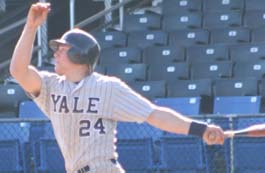March 6,
2008
Yale’s Lavarnway: Grand Marshal
of Hit Parade
By Andrew Finley
CollegeBaseballInsider.com
In 2007, the best hitter in college baseball did
not attend classes in California, Texas or Florida.
 Ryan Lavarnway attends classes in New Haven,
Conn., at Yale University. Last season, he led all Division I
hitters with a .467 average. Ryan Lavarnway attends classes in New Haven,
Conn., at Yale University. Last season, he led all Division I
hitters with a .467 average.
Lavarnway is not just a singles hitter – he also
led D-I with an .873 slugging percentage, with 32 of his 70 hits
going for extra bases, including 14 home runs.
“He's got the one thing you can't teach, he's got
power,” Yale coach John Stuper said.
Added Dartmouth coach Robert Whalen: “He's a very
dangerous hitter, the kind you try not to let beat you if you
can.
Whalen also emphasized that Lavarnway possesses
fantastic “plus plus” raw power. Stuper said he was the best
position prospect he has coached in his 16 years at Yale.
In addition to his breakout season at the plate,
Lavarnway became the Bulldogs' starting catcher in 2007,
starting 30 games.
Lavarnway said he was recruited to Yale as a
“hard-nosed defensive outfielder. Any offense I could provide
would be gravy.”
A Yale assistant noticed him at a camp. “He was
diving all over the place, really aggressive,” Stuper said.
Yale was the only Division I offer Lavarnway
received, and since he had always planned on completing college,
he was happy to sign at such an excellent academic institution.
When he hit .482 during his senior season at El Camino Real High
School in Woodland Hills, Calif., after growing 6 inches during
his junior year, it was too late for other schools to try to
snatch him away. He received some attention from professional
scouts but was committed to attending college.
In 2006 Lavarnway, was the starting right fielder
and delivered a solid, if unspectacular season as a freshman. He
hit .281 with six home runs and 25 RBI while playing a solid
right field.
“He doesn't run great, but gets good jumps and
takes good routes,” Stuper said. “He was a good defensive
outfielder.”
That winter, Lavarnway asked the coaching staff
for an opportunity to catch, and caught some bullpen sessions in
the spring. The coaching staff liked the way he received the
ball and noticed he had good hands.
Meanwhile, Lavarnway had devoted himself to
training during the offseason. Lavarnway, who is 6-3, now weighs
in at about 230 pounds after arriving on campus at about 200,
according to Stuper.
“It's mandatory for the players to be in the
weight room three or four times a week, and he has taken that to
the nth degree,” his coach said.
In 2007, the Bulldogs found a new catcher.
“The transition was difficult physically at
first,” Lavarnway said. “I love catching. “The mental focus as a
catcher is much greater, knowing what a pitcher needs to know
about their mechanics or needs to hear. This is the stuff that I
love about baseball.”
Of course, during 2007 Lavarnway also was
becoming the most dangerous offensive player in the Ivy League
and one of the best in the country. He was named to Baseball
America's All-American Third Team.
“He has good hitting skills for a kid with
plus-plus power,” Whalen said.
Added Stuper: “You hope kids improve, but you
never dream that he could improve this much.”
Even as Lavarnway was having a terrific offensive
season, he was improving his defensive work at the most
demanding position on the diamond. Stuper noted that his
footwork improved every day and continues to get better. He also
has good arm strength and accuracy.
“I think he's going to catch at the next level,
and most scouts I talk to agree,” Stuper said.
Lavarnway also has become a team leader. The
pitching staff enjoys throwing to him, and he has developed a
knack for saying the right thing or staying quiet to keep a
pitcher focused, Stuper – former big league pitcher – said.
“Something that can go unnoticed for young
leaders is personal relationships on and off the field, knowing
what makes your teammates tick,” Lavarnway said.
Attending Yale has also been a good experience.
“The fact that student-athletes at Yale don't get
any special privileges says a lot about the institution,” he
said.
Students must graduate in four years, so they
cannot avoid a full class load.
“It really teaches you some life skills,”
Lavarnway said.
The Ivy League has no scholarships, so schools
typically do not get finished products, according to Stuper. In
addition, they have to recruit the brightest students in the
country.
“We try to develop these kids as players and
people,” Stuper said. “It's really rewarding with a guy like
Ryan.”
|